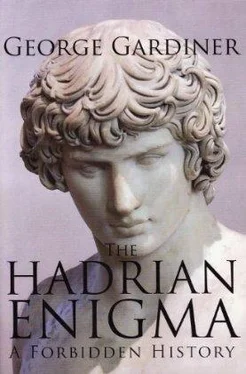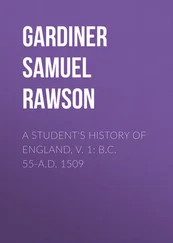George Gardiner - A Forbidden History.The Hadrian enigma
Здесь есть возможность читать онлайн «George Gardiner - A Forbidden History.The Hadrian enigma» весь текст электронной книги совершенно бесплатно (целиком полную версию без сокращений). В некоторых случаях можно слушать аудио, скачать через торрент в формате fb2 и присутствует краткое содержание. Жанр: Исторические приключения, на английском языке. Описание произведения, (предисловие) а так же отзывы посетителей доступны на портале библиотеки ЛибКат.
- Название:A Forbidden History.The Hadrian enigma
- Автор:
- Жанр:
- Год:неизвестен
- ISBN:нет данных
- Рейтинг книги:5 / 5. Голосов: 1
-
Избранное:Добавить в избранное
- Отзывы:
-
Ваша оценка:
- 100
- 1
- 2
- 3
- 4
- 5
A Forbidden History.The Hadrian enigma: краткое содержание, описание и аннотация
Предлагаем к чтению аннотацию, описание, краткое содержание или предисловие (зависит от того, что написал сам автор книги «A Forbidden History.The Hadrian enigma»). Если вы не нашли необходимую информацию о книге — напишите в комментариях, мы постараемся отыскать её.
A Forbidden History.The Hadrian enigma — читать онлайн бесплатно полную книгу (весь текст) целиком
Ниже представлен текст книги, разбитый по страницам. Система сохранения места последней прочитанной страницы, позволяет с удобством читать онлайн бесплатно книгу «A Forbidden History.The Hadrian enigma», без необходимости каждый раз заново искать на чём Вы остановились. Поставьте закладку, и сможете в любой момент перейти на страницу, на которой закончили чтение.
Интервал:
Закладка:
Pachrates voice soared in rising emotion, encouraging the assembly to heightened enthusiasm.
Suetonius immediately recalled the phrase "an exchange of boons" from somewhere among the recorded testimonies. It suggested Pharaoh/Caesar had now acquired the vitality of the twenty-three year old Bithynian by some sort of magical exchange. Was Urbicus correct in his claim about Pachrates after all? Suetonius pondered, or was Balbilla following somehow in her grandfather's steps on behalf of the Augusta?.
Pachrates proudly strode to Hadrian and placed the small scarlet figurine into the open palm of his hand. Hadrian cast his eyes over it with delicacy and distinct reserve. He seemed uncertain of the object. Pachrates continued his performance.
"My Lord Caesar, wear this mystical amulet deriving from the very bloodstream of Antinous of Bithynia. Adorn yourself for evermore with this jewel," the hierarch declaimed for all to hear. "This miraculously-generated icon transfers the health and years of the dead youth to you, our Princeps, the Pharaoh of our world. It expresses the Hidden God, Amun-Re's, beneficence to our generation! We all rejoice in Antinous, Osiris Reborn!"
Pachrates, Kenamun, and the assembled priests bowed low in a choreographed flourish towards the emperor.
The biographer and Surisca exchanged questioning glances.
Hadrian's demeanor transformed. His brow darkened. His skin perceptibly grayed. Signs of excruciating pain glinted from his eyes. His lips blanched into an aggrieved thinning. A stoop descended upon him whose very burden aged him a decade in seconds. His cough revived in his craw.
He raised himself shakily from the throne to glance dartingly from the blood-red jewel in his palm, to the cadaver serene upon the bier, to the glistening viscera lying larded on the golden platter. Several hundred pair of eyes watched his every motion.
Those observing this escalating transformation stiffened in uncertainty at the emperor's looming disposition. The priests intuitively stepped back a pace as they braced in anticipation of something ominous. None had previously witnessed such a rancor fall across their emperor's features. Hadrian was on the verge of eruption. Its sight numbed marrows, chilled blood, and weighed tongues.
With a wounded howl fit to harrow Hades himself, Hadrian leaned at the side of the throne to forcefully discharge his entire stomach's contents onto the flagstones nearby. He vomited a voluminous projectile spray across the slabs, splattering the sandals and boots of both Governor Titianus and Geta standing to the side of the throne, as well as Macedo and a guardsman nearby.
The putrid discharge displayed streaks of black blood and emitted a malodorous stench into the sanctuary.
A deep groan surged across the assembly.
Geta leaped to Caesar's aid to hold his elbow to offer support. The Augusta, remained upright in her seat, immobile, entranced. The entire entourage remained stiffly rooted to their places. No soldiers moved, no pages approached, no priests knelt.
Suetonius glanced around the faces before him. All were grave, except one. Decurion Scorilo, standing at the head of his detachment of Horse Guards, his eyes firmly planted on his commander in chief, the emperor, was assimilating every tremor of Caesar's distress. He was subtly alight with an expression akin to a smile. Suetonius determined it was the token of some inexplicable victory.
Meanwhile, on looking to Governor Titianus, his consort Anna Perenna, and Centurion Urbicus nearby, he could see each was severely restraining their emotions. The Augusta was formally, immutably composed, while Balbilla was visibly discomforted.
Arrian was troubled. Vestinus was agitated. Macedo displayed increasing alarm. Commodus exuded confident apprehension, distracted by checking his vestments and hair for stains or spots.
Hadrian braced himself on the throne's armrest to cast his eyes at the two hierarchs before him. After a short, choked coughing bout and clearing his throat, he gathered his composure sufficiently as his voice weakly rasped into the cavernous gloom. His gaze had settled wistfully on the figure upon the bier. But his words were not what the gathering could have anticipated.
"Little soul, roamer and charmer,
My body's comrade and its sometime guest,
What dominion now must be your goal,
Pale and stiff and naked?
Unable now, like us, to jest."
The assembly stood rock still in oppressive silence. Many wondered whose soul Caesar reflected upon. His own or that of the figure on the bier? And what did 'sometime guest' convey?
Then Hadrian's voice resumed its usual commanding resonance. It grew in power as he spoke.
"Priests of Isis, Serapis, and Amun, place a worthy gold coin on the Bithynian's tongue for his journey's fee with Charon to the Land Of The Dead.
Say holy rites over Antinous to prepare him for his journey. Impress a death mask from his features to retain for our fond memory.
Take his earthly remains and perform your most effective arts upon him to embalm him for posterity. Spare no cost to preserve his tissues with loving respect. I will send the Dacian, Geta, to you shortly with special instructions for ceremonies to honor the youth's life."
The assembly relaxed from its dread.
"It will be done, Great Caesar," Pachrates affirmed as he waved hurriedly to temple attendants to cleanse the mess on the flagstones. Attendants in workman's leathers scurried in the background with sponges, water, and generous splashes of perfume.
The emperor returned to his formal manner.
"But we are not finished here yet, Egyptian magi. Stay! It is time for my Special Inspector to make his report to the Household in our presence," Hadrian announced.
Alarm! Panic! Suetonius clenched his fists while Clarus drew breath and bit a lip. They were both unprepared for such a duty. They assumed the report would be delivered later in the privacy of Hadrian's chambers. Suetonius realized his hundred thousand sesterces and the security of his head on his shoulders could be at risk.
But as he contemplated this less-than-desirable fate his attention was drawn by Strabon's tap at the elbow. The scribe pointed to the group of temple workers cleaning the temple floor before them. Among the gathering he spied a particularly unexpected face.
Suetonius peered toward the man. For a brief moment he couldn't place precisely where he had seen the fellow previously. It then struck him.
It was Hetu the fisherman who had discovered Antinous's body beneath the river's waters two dawns earlier with his cousin Ani. Hetu had not been killed by Ani's murderers after all!
Hetu and Suetonius's eyes met in fleeting recognition while the Egyptian was addressing to his tasks, but the fisherman flicked away in fear.
Suetonius immediately realized his fund of fragments from the two days of testimony possessed some slim unifying threads. The puzzle's solution was gradually taking shape. Or was it? How were these threads to be woven together in a meaningful way, he asked himself? What did they tell?
Yet were the stalking wolves themselves now being stalked, he wondered?
CHAPTER 31
Suetonius stood before the assembly to deliver his report. Clarus, Strabon, and Surisca stood a pace behind him, each wondering what their Special Inspector could possibly assert under the circumstances.
"Great Caesar, you have instructed Senator Claudius Septicius Clarus and I, Gaius Suetonius Tranquillus, to examine the circumstances of the death of your Companion of the Hunt, Antinous of Bithynia.
You commanded us to investigate the manner of his death and the reason for his death. The enquiry was to be completed within the space of two days and two nights," Suetonius declaimed magisterially in his least-quavering barrister's vocal technique. It had worked well enough decades ago at the Bar of Rome but was a little rusty, he thought.
Читать дальшеИнтервал:
Закладка:
Похожие книги на «A Forbidden History.The Hadrian enigma»
Представляем Вашему вниманию похожие книги на «A Forbidden History.The Hadrian enigma» списком для выбора. Мы отобрали схожую по названию и смыслу литературу в надежде предоставить читателям больше вариантов отыскать новые, интересные, ещё непрочитанные произведения.
Обсуждение, отзывы о книге «A Forbidden History.The Hadrian enigma» и просто собственные мнения читателей. Оставьте ваши комментарии, напишите, что Вы думаете о произведении, его смысле или главных героях. Укажите что конкретно понравилось, а что нет, и почему Вы так считаете.












